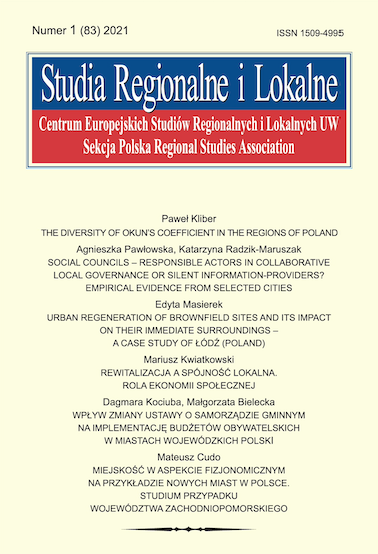Wpływ zmiany ustawy o samorządzie gminnym na implementację budżetów obywatelskich w miastach wojewódzkich Polski
Influence of the Amendment to the Law on Municipal Self-Government on the Implementation of Participatory Budgeting in Voivodship Cities in Poland
Author(s): Dagmara Kociuba, Małgorzata BieleckaSubject(s): Law, Constitution, Jurisprudence, Geography, Regional studies, Sociology
Published by: EUROREG - Uniwersytet Warszawski, Regional Studies Association - Sekcja Polska
Keywords: participatory budgeting process; principles and organisation of participatory budgeting; financial mechanism of participatory budgeting; civic participation; model of participatory budgeting; voivods
Summary/Abstract: The aim of the study is to examine the impact of the amendment to the Municipal Self-Government Act (hereinafter: MSGA; Journal of Laws 2018, item 994) on the implementation of participatory budgeting (PB) in 2019 and 2020 in Polish voivodship cities. Using the desk research method, 36 PB regulations and over 3.4 thousand projects were selected for implementation in 10 categories: 1) sports (investment and other), 2) leisure and recreation (investment and other), 3) construction or modernisation of sidewalks, 4) construction or modernisation of streets, 5) pedestrian walkways, 6) parking lots, 7) lighting, 8) city bicycles (bicycle infrastructure), 9) modernisation of buildings, and 10) other (e.g. educational, cultural, training). Detailed studies were carried on the influence of legislative changes on: 1) financial mechanisms; 2) principles and organisation of the budgeting process; 3) generic structure of projects; 4) participatory budgeting model. In order to verify the results obtained, changes in the PB regulations not resulting from the MSGA provisions were additionally analysed. It was shown that the amendment to the Act had a significant impact on the implementation of PB in all the analysed cities. The changes mainly concerned the financial and formal-organisational aspects of participatory budgeting process. The most crucial ones include: increase in the size of the overall subsidies (in 15 cities), modification of the distribution of the financial means (9), introduction of letters of support at the stage of project submission (7) and appeal procedure (9). Among the “non-statutory” activities, the abolition of age limits in the remaining 7 cities should be mentioned. These activities brought positive effects on the increase in turnout (15), the number of projects selected for implementation (12) and their average value (13). On the other hand, the changes in MSGA did not affect the generic structure of the projects (in both years, in 10 cities the category “leisure and recreation” prevailed, and 1149 projects from this category were selected for implementation). The final unification of the PB implementation model in Polish voivodship cities has been completed. Finally, three modes of PB implementation according to the new rules were indicated: financial, procedural and combined.
Journal: Studia Regionalne i Lokalne
- Issue Year: 22/2021
- Issue No: 83
- Page Range: 84-111
- Page Count: 28
- Language: English, Polish

